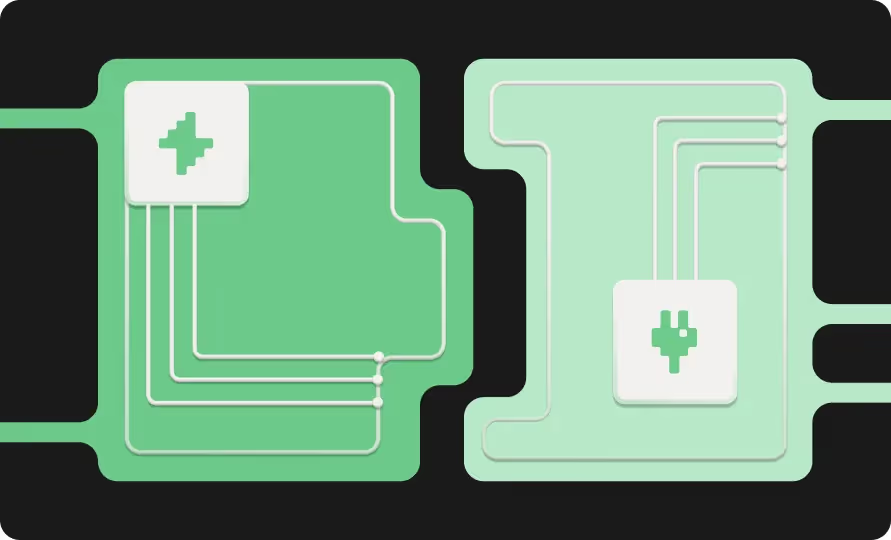So you’re looking for a reliable, future-proof, and well-paid career. Congratulations: you’ve found it. Data is already the backbone of numerous industries, and as companies adapt to the new digital age (that’s going to be increasingly influenced by AI), data is going to be gold. And guess what: data engineers are going to play a key role in turning that gold into value for companies. The stats back up just how vital these professionals are:
- The data engineering industry has grown by 22.89% just in the last year.
- 22.8% of job descriptions on Indeed don’t mention degree requirements, so non-traditional applicants can apply.
- $131,000 is the median total annual pay for data engineers according to Glassdoor, with entry-level workers earning a median of $105,000 (as of the time of this writing).
Data engineering is a prime field. It’s growing, it’s open, and it’s well-paid. So now, you’re probably already planning some steps to become a data engineer. We can help. Continue reading to find out all you need to know about how to become a data engineer.
What is data engineering?
What does a data engineer do?
In short, they build the infrastructure that enables data professionals downstream to do their jobs. But let’s get more detailed. What do data engineers do? Here are some common data engineer job responsibilities:
Data engineer responsibilities
Crucially, before we get into a discussion of the roles and responsibilities of data engineer workers, we just need to say: read job descriptions. Seriously. This field can have wide variation since companies can differ on what fits under “data engineering.” Now, with that said, there are generalities that hold true across most data engineering roles:
Crafting and maintaining data pipelines
These professionals spend a good deal of their time on extract, transform, load or extract, load, transform processes (you’ll see it listed as ETL/ELT). Basically, they take data and make it usable for their organizations.
Designing data models and database architecture
This is the corollary to the previous entry. As part of the data refining process, they structure it via data models to make it consistent and clear. In addition, they choose storage (such as PostgreSQL, Snowflake, MongoDB, or Delta Lake, depending on the use case) and define patterns so the data is accessible.
Collaborating with data scientists/analysts as well as other stakeholders
To build models, data scientists need good, clean training data. To get good insights, data analysts need good data warehouses. And at a larger scale, all data positions are working to achieve business goals in association with leaders and other stakeholders. All of that relies on getting good data — the core job of the data engineer. That means data engineers need to collaborate well with both the data team and other experts at their companies.
Seeing to data security and governance
This is a major responsibility; data engineers will often be handling private data that shouldn’t leak. Thus, they need to keep it safe with access control, encryption, and masking and anonymization. In addition, they need to make sure to maintain metadata and document lineage, often in collaboration with in-house governance teams. This all needs to be done to stay in compliance with standards such as GDPR, HIPAA, SOC-2, and more.
Data engineer vs data scientist
Data engineers differ from data scientists in what they do with data. Data engineers build the digital pipes and storage tanks that get data to data scientists. Data scientists then use that data to build models that can independently generate insights and thus accomplish business goals.
Data engineers do what their name suggests — they’re more on the engineering side of things. The role emphasizes software development, overseeing databases, and developing system architecture. This is as opposed to data scientists, who are focused on applying stats and machine learning to the data the engineers make usable to then develop models that can guide decision making.
Why become a data engineer: Career outlook and salary
Job market demand in the US
To say it bluntly: data engineers are in high demand. In fact, just last year, 20,000 new jobs were added within data engineering. This comes from industries as diverse as tech, healthcare, finance, and e-commerce, all of which are in constant need of new data professionals.
This isn’t just a trend from last year, either. As of this writing, there were over 82,000 data engineering positions open on LinkedIn. And that’s just one platform. These jobs are at the tech heavyweights you’d expect — Adobe, Perplexity, Netflix, OpenAI, Google — but also across the business spectrum, including tiny startups and medium-sized businesses beginning to grow. It’s a specialization that can take you where you want to go; the demand for data professionals is so high that this expertise will allow you to have more say in where you end up (maybe even remote!).
Salary expectations
All of that leads to good salaries in the US. As we mentioned in the intro, the overall median total pay is $131,000 according to Glassdoor as of this writing. Put that in comparison to the United States Bureau of Labor Statistics’s findings for salaries for people in computer occupations in general, $105,990, and the economy-wide median: $49,500. Yeah, it’s a nice bump from both of those.
But that’s just the median. For more information on data engineer salaries, here’s a table (all info from Glassdoor as of the time of this writing):
Note: Because of the oddities in how Glassdoor organizes data, the above is just for roles with the explicit title of “data engineer.” If you instead look under “senior data engineer”, it jumps to $171,000 median total pay. Then, one step above that, “principal data engineer” has a median total pay of $208,000, so there’s tons of space for income growth.
Geographic variations
Not only does experience inflect the pay; location does as well. Here’s what you can expect to make as a data engineer in different locations:
Data engineer career paths
So far, we’ve just been speaking about data engineering, but as you move through this career, you’ll have the chance to specialize or follow a leadership track. Here’s what the salaries for these roles look like:
Do you need a computer science degree to become a data engineer?
No, a computer science degree is not a hard requirement for data engineering jobs. People with degrees in physics, accounting, business, philosophy, or English can all go on to be successful in this role. In fact, the only real data engineer requirements you’ll have to meet are having the requisite skills as well as a portfolio of projects that prove you have applied them. For data engineering roles, skills trump credentials.
Hands-on experience is what’ll truly help you thrive, and in fact, one survey surfaced that 80% of employers are open to hiring non-traditional applicants, so there really aren’t hard-and-fast data engineer education requirements, either. Not only does that mean that people with degrees in non-computer-science fields are more than welcome; it also means that people without degrees at all are also well within consideration for roles such as these.
But don’t kid yourself; while a data engineer degree isn’t necessary, you’ll still need skills. If you’re wondering how to become a data engineer without a degree, you can start out using free resources such as YouTube. There, you can get a feel for what you’re going to have to master. If you’re deeply self-motivated, you might even be able to teach yourself all you need to know on your own, and you can add polish to your learning with a professional certification such as DASCA ABDE.
However, data engineer qualifications can be difficult to achieve by yourself. Guidance from professionals can really accelerate you on this path, and that comes in the form of a good AI & ML bootcamp. There, you’ll have industry-seasoned experts teaching you the need-to-know data engineer skills that employers are actually looking for, and you’ll have career-search support once you master the material itself, so you’ll have the best chance of making it in a data career.
And as part of learning at a bootcamp, you’ll finish with a portfolio of projects by design. When you’re coming into the field fresh or from another career (say, teaching or accounting), these projects will be the tentpoles of your applications down the line.
To cap that all off, your tuition is guaranteed: if you don’t get a relevant job within 10 months of finishing the bootcamp, you’ll get your tuition refunded.
Essential data engineering skills
If you’re still wondering what to study to become a data engineer, we’ve boiled down the key skills you’ll need to master to land that data engineering job. So dive in. Here are the skills needed for a data engineer position:
Programming languages
- Python: This is a cornerstone skill for data engineering. Python is a robust language that allows you to do everything from scripting to automation to data processing.
- SQL: This language allows you to interact with and manage databases, and as databases are a big part of a data engineer’s work, it’ll be crucial.
- Java/Scala: Knowing one of these will help you work with big data or distributed data frameworks, for example, so some skills here will help ensure you keep growing.
Database management
- Relational databases: This includes tech such as PostgreSQL and MySQL. You should be fluent in these tools for schema design, normalization, and indexing.
- NoSQL databases: MongoDB and Cassandra, for example, will be useful when you need to handle unstructured data.
- Data warehousing: Mastering Slowflake, Amazon Redshift, or Google BigQuery will give you the needed know-how here.
ETL processes and data pipeline tools
- ETL/ELT processes: This is the backbone competency you’ll be applying almost daily, so skills here will be crucial.
- Data pipeline tools: Apache Airflow, Apache Kafka, and Apache Spark might all end up being vital tools you apply in your day-to-day data engineering work, so learning how to apply them will serve you well.
Cloud platforms
- AWS: As the recent outage has shown, much of the internet runs on this platform, so skills in S3, Glue, Redshift, EMR, or Lambda will be helpful.
- Google Cloud Platform (GCP): Another major cloud platform. Knowing BigQuery, Dataflow, and Pub/Sub will allow you to make full use of it.
- Microsoft Azure: This is often used in enterprise situations, and knowing Data Factory, Synapse, or Databricks will give you the skills to interact with it.
Additional tech skills
- Version control: Using Git/GitHub to track and monitor changes to code.
- Linux/Unix command line basics: A functional understanding and familiarity here will give you flexibility in your tech stack.
- Basic understanding of distributed systems: You’re going to be pulling and sending data all over the place. Knowing the technical fundamentals will help you do that efficiently.
Soft skills
- Problem-solving: You’re going to be faced with unexpected and perplexing problems, so the capacity to come up with creative solutions will take you far.
- Communication: Collaboration is a cornerstone of this job, so being able to get your ideas across and hear what others have to say will both be vital.
Note: This is a general overview. Depending on where you end up working, the company may have a different tech stack, so if you find yourself particularly drawn to using one specific Cloud platform, for example, it is possible to match your know-how to a job’s requirements. Once again, we’ll encourage you to look at vacancies on LinkedIn, find the work you think you’d like to take on, and see what skills these descriptions are asking for.
How to become a data engineer in 2025: step-by-step
So you’re down here, meaning you’re still interested in becoming a data engineer. Fantastic. Now let’s get more detailed. Here’s an easy guide to follow to land that data engineer job:
Learn data engineering on your own: 12 month guide
Step 1: Programming fundamentals (months 1–3)
- Python basics: Become familiar with control structures, functions, and data structures.
- SQL basics: Learn the ins-and-outs of queries, joins, aggregations, and subqueries.
- Build out curiosity and insight: Use free resources such as YouTube tutorials.
- Practice: Hone your skills with platforms such as LeetCode or HackerRank.
Capstone work: Complete three beginner projects in Python and write over 50 SQL queries.
Step 2: Database fundamentals (month 4)
- Relational databases basics: Become familiar with normalization, indexing, and optimization.
- NoSQL vs. SQL: Learn the basics of each approach to databases as well as when and how to apply each.
- ACID properties: Gain an understanding of what these properties are as well as how they affect database transactions.
- Practice: Find a problem in your own life a database can solve — maybe tracking a collection of your own such as albums or movies.
Capstone work: Design two database schemas to solve real-world problems.
Step 3: ETL and data pipelines (months 5–6)
- ETL vs ELT: Learn the difference between the two as well as when you should apply each.
- Workflow orchestration: Specifically using Apache Airflow, gain insight into how orchestration matters for a data practice.
- Batch processing vs. real-time streaming: Understand where each is best applied as well as how to do so.
- Practice: Use your previous practice database to brush up on data transformation and validation.
Capstone work: Mock up (and even build) two basic data pipelines from scratch.
Step 4: Cloud platforms (months 7–8)
- Choose a primary platform: AWS, GCP, and Azure are all popular, but investigate the contexts in which each is most commonly used, and let that guide your choice.
- Cloud data storage: Learn S3 (AWS), Cloud Storage (GCP), or Blob Storage (Azure), depending on which platform you’ve chosen.
- Managed data services: Get familiar with Glue (AWS), Dataflow (GCP), or Data Factory (Azure).
- Practice: Create a free account with the platform provider and launch a personal project.
Capstone work: Launch two projects using the chosen provider’s free tier.
Step 5: Big data tech (months 9–10)
- Distributed data processing: Learn when this is best applied and how to leverage Apache Spark.
- Hadoop ecosystem basics: Gain an understanding of HDFS and MapReduce.
- Stream processing: Master using Kafka or Flink for this purpose.
- Practice: Find a project that interests you on GitHub and see what you can do.
Capstone work: Find public big data sets and process one using Spark.
Step 6: Portfolio work (months 11–12+)
We’ll break from the previous format here, because this is all one big action item: build out your profile with real projects. Within the previous five steps, you will have already architected the basics of this, so consider making those capstone projects fuller, more robust and end-to-end.
This will add entries to your portfolio while proving and locking in your know-how. And as part of this, be sure you don’t keep your work to yourself. Host projects on GitHub with clear, in-depth documentation, and start a blog explaining the projects: what you did, why you did it, and what came of it.
All of this will set you up to stand out to recruiters now that you have learned the basics of data engineering and are thus ready to launch your career.
Learn data engineering in 9 months with a bootcamp
Now, that’s all assuming you want to take on your data engineer education all on your own. However, if you want to speed up the process and gain career support as well, consider enrolling in an employment-focused bootcamp. Here’s a quick table to compare the two:
Who is a data bootcamp best for?
A data bootcamp is best for people who:
- Want to maximize their chances of landing a job in their new field.
- Have limited time to study on their own and so want every minute to be as effective as possible.
- Learn best with accountability as well as with experts providing guidance.
- Need to make the transition quickly.
- Prefer gaining know-how among a community of like-minded aspiring techies.
FAQ
How long does it take to become a data engineer?
It typically takes 12-18 months to learn all you need to know to become a data engineer if you’re learning on your own from scratch. Bootcamps can speed this process up substantially, cutting that time potentially in half. This also depends on where you’re coming from. If you’re already well-versed in tech, this process may be quicker than if you’re coming from a non-tech background.
Can I become a data engineer without a computer science degree?
Yes, you can absolutely become a data engineer without a computer science degree. Many thriving professionals in the field came to it from unrelated backgrounds, such as English or business, and many others don’t even have degrees at all. The main thing you need are data skills and portfolio projects that prove your abilities.
What programming languages do data engineers need to know?
Data engineers need to know Python and SQL. They are the tools these professionals will regularly use, as Python can enable automation and processing, and SQL is the language by which people interact with and manage databases. However, Java and Scala are also good languages to know to prepare you to work with big or distributed data later in your career.
Do data engineering certifications help with getting hired?
Data engineering certifications can help in the hiring process, but they’re not the most important qualification on their own. They’re truly powerful when they back up a portfolio that presents a candidate’s practical experience. In this case, they are not decontextualized and instead verify the expertise demonstrated through hands-on projects. Certifications are great, but demonstrable skills matter most.
Is data engineering hard to learn for beginners?
Data engineering can be a challenge for beginners to learn, but it is like any new skill; it has a learning curve. The main difficulties come from mastering new coding languages and complex digital tools and systems. However, with the right approach and dedication, it is eminently realistic to learn skills in this field even as a beginner.
What industries hire data engineers?
Nearly every industry is hiring data engineers, but there is higher demand for these professionals among companies in tech, finance, healthcare, and e-commerce. Within these industries, data engineers can find themselves helping with recommendation algorithms, lending expertise to fraud prevention, assisting with patient outcome analysis, or playing a part in optimizing logistics. Across industries, data engineers are in demand and take on diverse tasks.
Can data engineers work remotely or freelance?
Yes, data engineers can work remotely or freelance. Many companies are still saving money on real estate by having workers, such as data engineers, doing their tasks remotely. As for freelancing, it is indeed possible to find opportunities on Upwork or Fiverr, but this is less common, as data engineers are more about long-term infrastructure-based work rather than developing and sending in one-off projects.


















